Case Study: Social Justice, Equality, and Democracy in Society
VerifiedAdded on 2022/11/14
|5
|1387
|462
Case Study
AI Summary
This case study explores the intricate relationship between freedom, tradition, social justice, equality, human rights, and laws within a democratic society. It emphasizes the importance of these elements for societal well-being and development. The study defines a democratic society as one where individuals have the autonomy to act according to their will and are guaranteed equal rights and access to justice. The government's role in implementing social policies to ensure societal development and the well-being of its people is highlighted. The concept of equality, irrespective of race, ethnicity, or religion, is central, ensuring everyone is treated similarly under the law. Social justice is presented as the backbone of society, ensuring equal opportunities in education, healthcare, and economic activities, and addressing issues like racism and class divisions. The preservation of freedom of speech and human rights is also underscored as crucial for a thriving democratic environment. The case study concludes by reiterating that social justice, equal rights, and freedom are the fundamental pillars of a democratic society, and that the equal treatment of all people, regardless of their backgrounds, is essential for a prosperous nation.
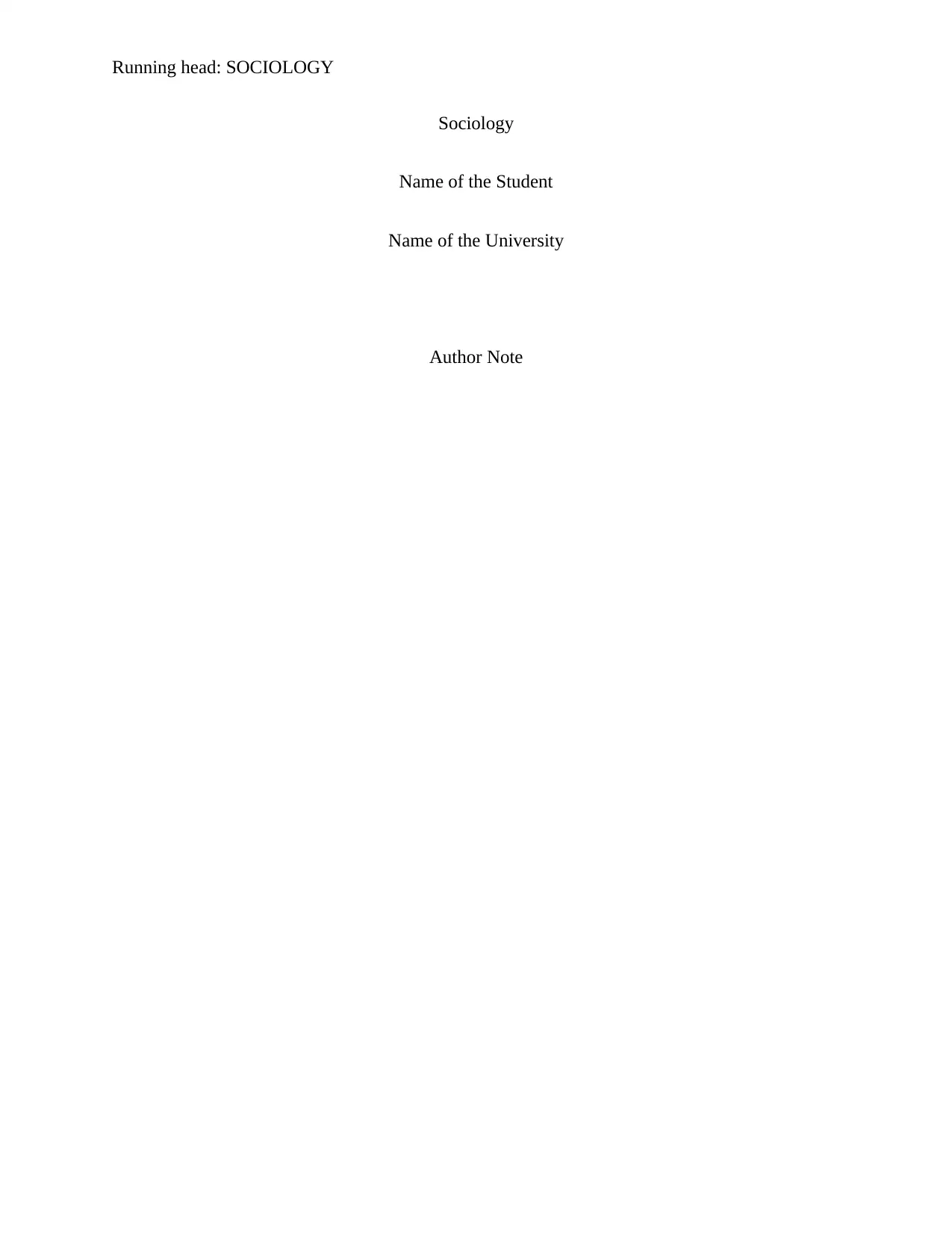
Running head: SOCIOLOGY
Sociology
Name of the Student
Name of the University
Author Note
Sociology
Name of the Student
Name of the University
Author Note
Paraphrase This Document
Need a fresh take? Get an instant paraphrase of this document with our AI Paraphraser
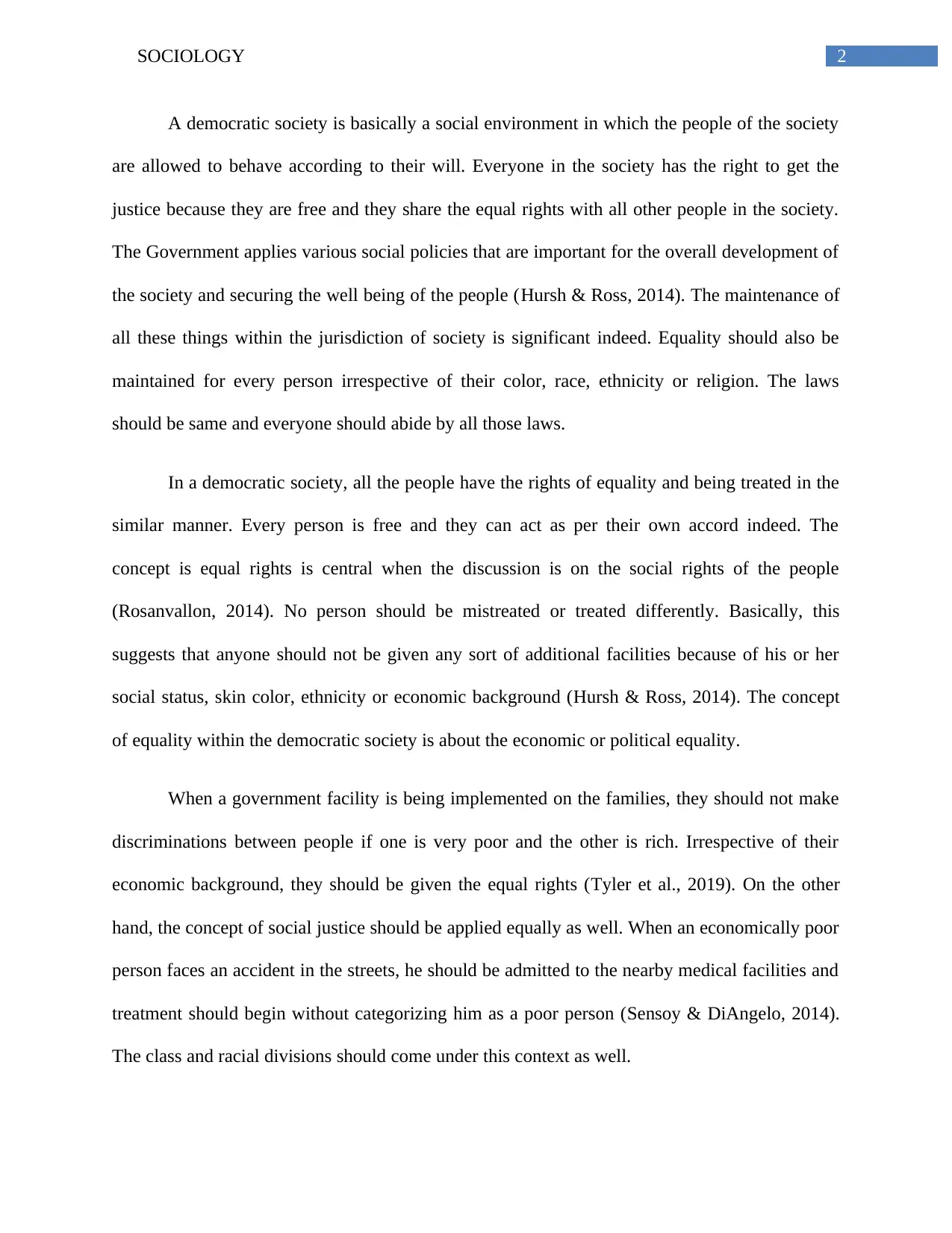
2SOCIOLOGY
A democratic society is basically a social environment in which the people of the society
are allowed to behave according to their will. Everyone in the society has the right to get the
justice because they are free and they share the equal rights with all other people in the society.
The Government applies various social policies that are important for the overall development of
the society and securing the well being of the people (Hursh & Ross, 2014). The maintenance of
all these things within the jurisdiction of society is significant indeed. Equality should also be
maintained for every person irrespective of their color, race, ethnicity or religion. The laws
should be same and everyone should abide by all those laws.
In a democratic society, all the people have the rights of equality and being treated in the
similar manner. Every person is free and they can act as per their own accord indeed. The
concept is equal rights is central when the discussion is on the social rights of the people
(Rosanvallon, 2014). No person should be mistreated or treated differently. Basically, this
suggests that anyone should not be given any sort of additional facilities because of his or her
social status, skin color, ethnicity or economic background (Hursh & Ross, 2014). The concept
of equality within the democratic society is about the economic or political equality.
When a government facility is being implemented on the families, they should not make
discriminations between people if one is very poor and the other is rich. Irrespective of their
economic background, they should be given the equal rights (Tyler et al., 2019). On the other
hand, the concept of social justice should be applied equally as well. When an economically poor
person faces an accident in the streets, he should be admitted to the nearby medical facilities and
treatment should begin without categorizing him as a poor person (Sensoy & DiAngelo, 2014).
The class and racial divisions should come under this context as well.
A democratic society is basically a social environment in which the people of the society
are allowed to behave according to their will. Everyone in the society has the right to get the
justice because they are free and they share the equal rights with all other people in the society.
The Government applies various social policies that are important for the overall development of
the society and securing the well being of the people (Hursh & Ross, 2014). The maintenance of
all these things within the jurisdiction of society is significant indeed. Equality should also be
maintained for every person irrespective of their color, race, ethnicity or religion. The laws
should be same and everyone should abide by all those laws.
In a democratic society, all the people have the rights of equality and being treated in the
similar manner. Every person is free and they can act as per their own accord indeed. The
concept is equal rights is central when the discussion is on the social rights of the people
(Rosanvallon, 2014). No person should be mistreated or treated differently. Basically, this
suggests that anyone should not be given any sort of additional facilities because of his or her
social status, skin color, ethnicity or economic background (Hursh & Ross, 2014). The concept
of equality within the democratic society is about the economic or political equality.
When a government facility is being implemented on the families, they should not make
discriminations between people if one is very poor and the other is rich. Irrespective of their
economic background, they should be given the equal rights (Tyler et al., 2019). On the other
hand, the concept of social justice should be applied equally as well. When an economically poor
person faces an accident in the streets, he should be admitted to the nearby medical facilities and
treatment should begin without categorizing him as a poor person (Sensoy & DiAngelo, 2014).
The class and racial divisions should come under this context as well.
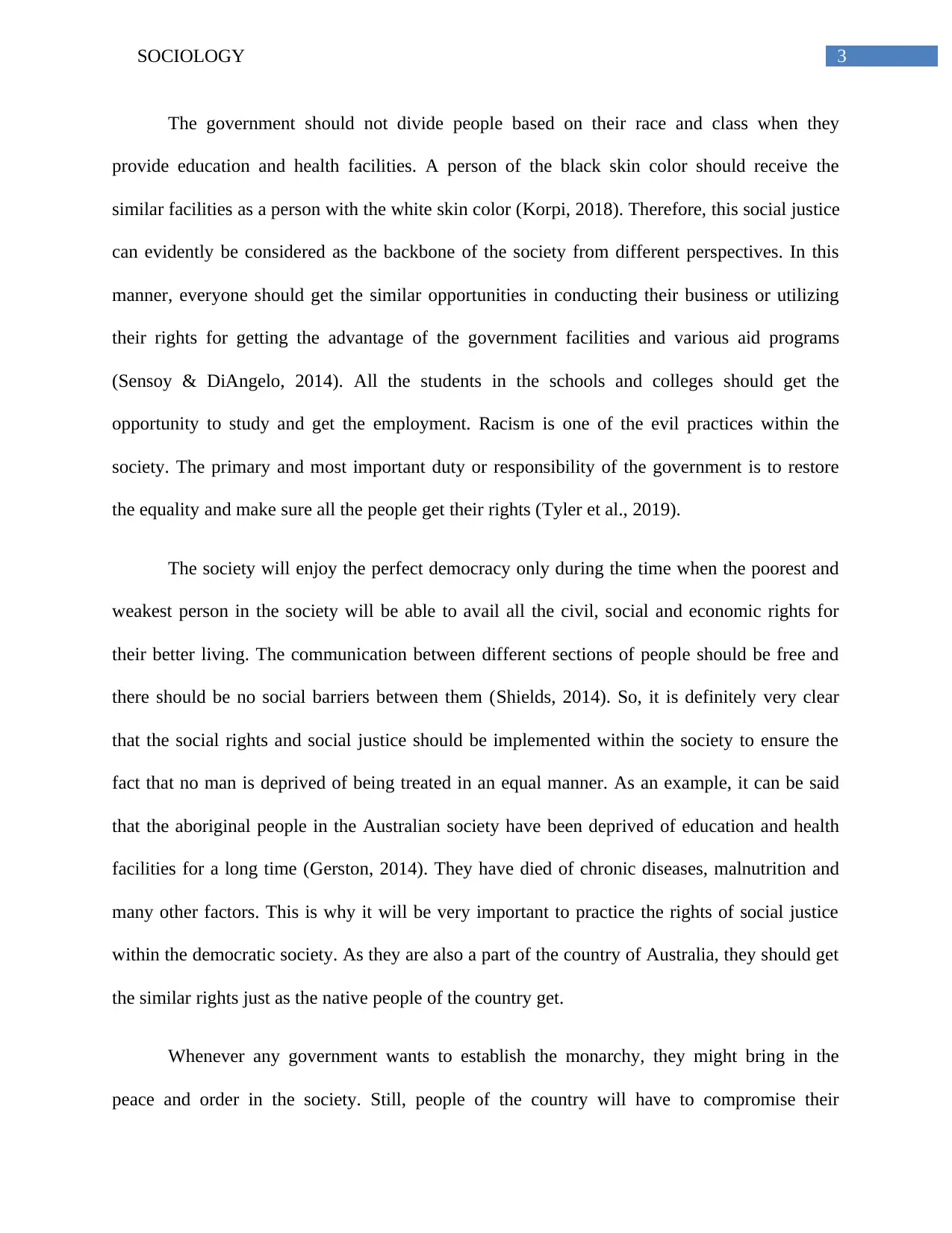
3SOCIOLOGY
The government should not divide people based on their race and class when they
provide education and health facilities. A person of the black skin color should receive the
similar facilities as a person with the white skin color (Korpi, 2018). Therefore, this social justice
can evidently be considered as the backbone of the society from different perspectives. In this
manner, everyone should get the similar opportunities in conducting their business or utilizing
their rights for getting the advantage of the government facilities and various aid programs
(Sensoy & DiAngelo, 2014). All the students in the schools and colleges should get the
opportunity to study and get the employment. Racism is one of the evil practices within the
society. The primary and most important duty or responsibility of the government is to restore
the equality and make sure all the people get their rights (Tyler et al., 2019).
The society will enjoy the perfect democracy only during the time when the poorest and
weakest person in the society will be able to avail all the civil, social and economic rights for
their better living. The communication between different sections of people should be free and
there should be no social barriers between them (Shields, 2014). So, it is definitely very clear
that the social rights and social justice should be implemented within the society to ensure the
fact that no man is deprived of being treated in an equal manner. As an example, it can be said
that the aboriginal people in the Australian society have been deprived of education and health
facilities for a long time (Gerston, 2014). They have died of chronic diseases, malnutrition and
many other factors. This is why it will be very important to practice the rights of social justice
within the democratic society. As they are also a part of the country of Australia, they should get
the similar rights just as the native people of the country get.
Whenever any government wants to establish the monarchy, they might bring in the
peace and order in the society. Still, people of the country will have to compromise their
The government should not divide people based on their race and class when they
provide education and health facilities. A person of the black skin color should receive the
similar facilities as a person with the white skin color (Korpi, 2018). Therefore, this social justice
can evidently be considered as the backbone of the society from different perspectives. In this
manner, everyone should get the similar opportunities in conducting their business or utilizing
their rights for getting the advantage of the government facilities and various aid programs
(Sensoy & DiAngelo, 2014). All the students in the schools and colleges should get the
opportunity to study and get the employment. Racism is one of the evil practices within the
society. The primary and most important duty or responsibility of the government is to restore
the equality and make sure all the people get their rights (Tyler et al., 2019).
The society will enjoy the perfect democracy only during the time when the poorest and
weakest person in the society will be able to avail all the civil, social and economic rights for
their better living. The communication between different sections of people should be free and
there should be no social barriers between them (Shields, 2014). So, it is definitely very clear
that the social rights and social justice should be implemented within the society to ensure the
fact that no man is deprived of being treated in an equal manner. As an example, it can be said
that the aboriginal people in the Australian society have been deprived of education and health
facilities for a long time (Gerston, 2014). They have died of chronic diseases, malnutrition and
many other factors. This is why it will be very important to practice the rights of social justice
within the democratic society. As they are also a part of the country of Australia, they should get
the similar rights just as the native people of the country get.
Whenever any government wants to establish the monarchy, they might bring in the
peace and order in the society. Still, people of the country will have to compromise their
⊘ This is a preview!⊘
Do you want full access?
Subscribe today to unlock all pages.

Trusted by 1+ million students worldwide
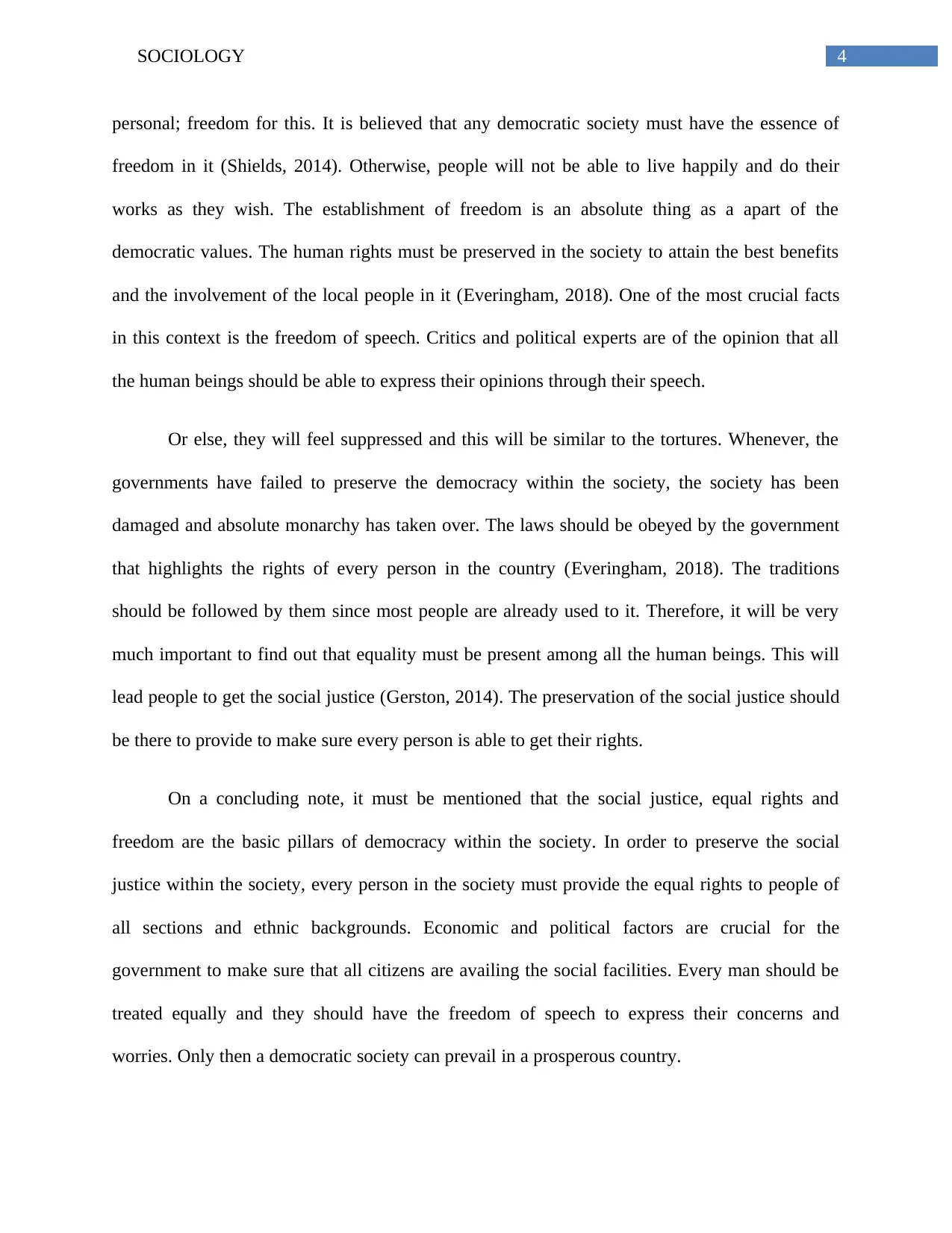
4SOCIOLOGY
personal; freedom for this. It is believed that any democratic society must have the essence of
freedom in it (Shields, 2014). Otherwise, people will not be able to live happily and do their
works as they wish. The establishment of freedom is an absolute thing as a apart of the
democratic values. The human rights must be preserved in the society to attain the best benefits
and the involvement of the local people in it (Everingham, 2018). One of the most crucial facts
in this context is the freedom of speech. Critics and political experts are of the opinion that all
the human beings should be able to express their opinions through their speech.
Or else, they will feel suppressed and this will be similar to the tortures. Whenever, the
governments have failed to preserve the democracy within the society, the society has been
damaged and absolute monarchy has taken over. The laws should be obeyed by the government
that highlights the rights of every person in the country (Everingham, 2018). The traditions
should be followed by them since most people are already used to it. Therefore, it will be very
much important to find out that equality must be present among all the human beings. This will
lead people to get the social justice (Gerston, 2014). The preservation of the social justice should
be there to provide to make sure every person is able to get their rights.
On a concluding note, it must be mentioned that the social justice, equal rights and
freedom are the basic pillars of democracy within the society. In order to preserve the social
justice within the society, every person in the society must provide the equal rights to people of
all sections and ethnic backgrounds. Economic and political factors are crucial for the
government to make sure that all citizens are availing the social facilities. Every man should be
treated equally and they should have the freedom of speech to express their concerns and
worries. Only then a democratic society can prevail in a prosperous country.
personal; freedom for this. It is believed that any democratic society must have the essence of
freedom in it (Shields, 2014). Otherwise, people will not be able to live happily and do their
works as they wish. The establishment of freedom is an absolute thing as a apart of the
democratic values. The human rights must be preserved in the society to attain the best benefits
and the involvement of the local people in it (Everingham, 2018). One of the most crucial facts
in this context is the freedom of speech. Critics and political experts are of the opinion that all
the human beings should be able to express their opinions through their speech.
Or else, they will feel suppressed and this will be similar to the tortures. Whenever, the
governments have failed to preserve the democracy within the society, the society has been
damaged and absolute monarchy has taken over. The laws should be obeyed by the government
that highlights the rights of every person in the country (Everingham, 2018). The traditions
should be followed by them since most people are already used to it. Therefore, it will be very
much important to find out that equality must be present among all the human beings. This will
lead people to get the social justice (Gerston, 2014). The preservation of the social justice should
be there to provide to make sure every person is able to get their rights.
On a concluding note, it must be mentioned that the social justice, equal rights and
freedom are the basic pillars of democracy within the society. In order to preserve the social
justice within the society, every person in the society must provide the equal rights to people of
all sections and ethnic backgrounds. Economic and political factors are crucial for the
government to make sure that all citizens are availing the social facilities. Every man should be
treated equally and they should have the freedom of speech to express their concerns and
worries. Only then a democratic society can prevail in a prosperous country.
Paraphrase This Document
Need a fresh take? Get an instant paraphrase of this document with our AI Paraphraser
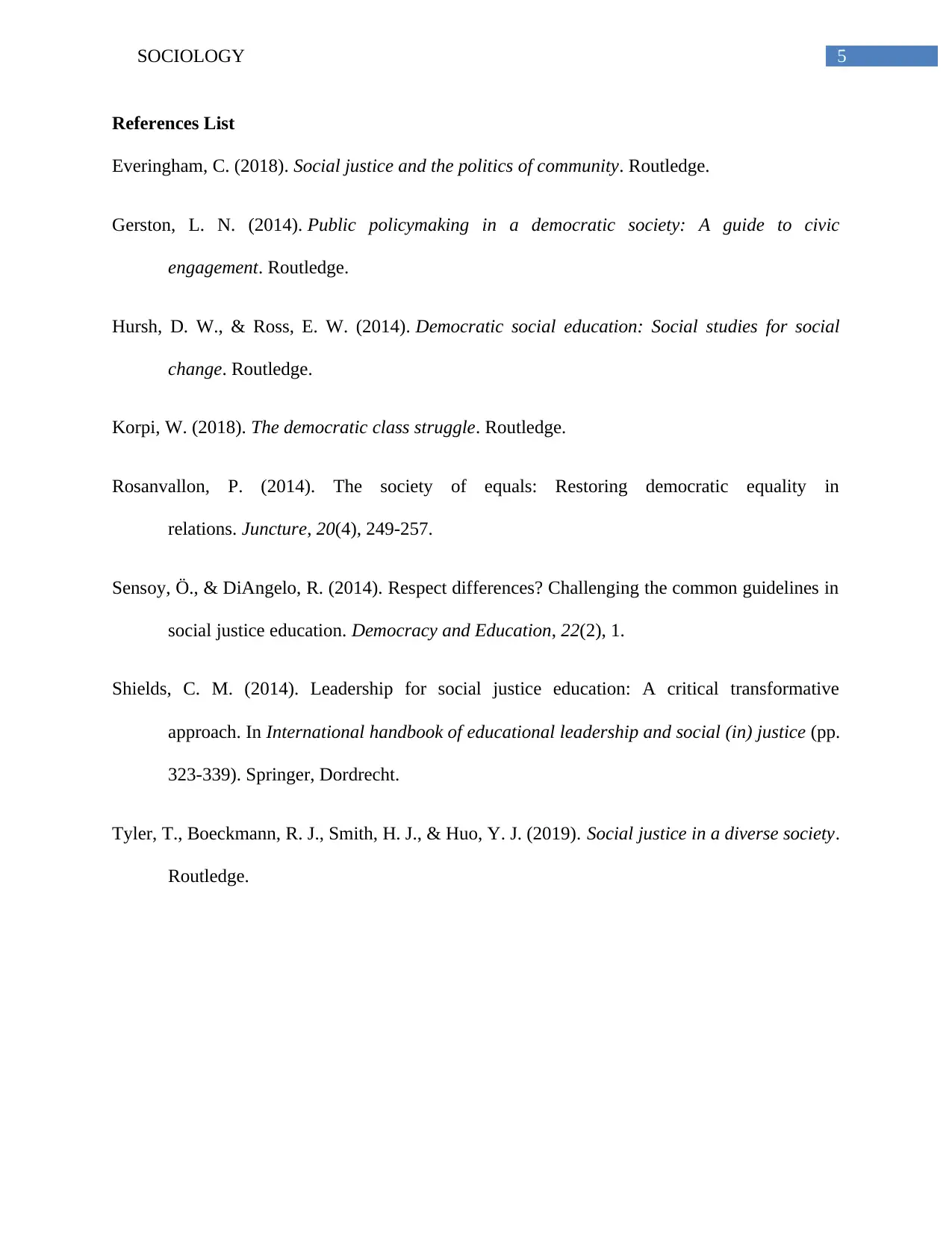
5SOCIOLOGY
References List
Everingham, C. (2018). Social justice and the politics of community. Routledge.
Gerston, L. N. (2014). Public policymaking in a democratic society: A guide to civic
engagement. Routledge.
Hursh, D. W., & Ross, E. W. (2014). Democratic social education: Social studies for social
change. Routledge.
Korpi, W. (2018). The democratic class struggle. Routledge.
Rosanvallon, P. (2014). The society of equals: Restoring democratic equality in
relations. Juncture, 20(4), 249-257.
Sensoy, Ö., & DiAngelo, R. (2014). Respect differences? Challenging the common guidelines in
social justice education. Democracy and Education, 22(2), 1.
Shields, C. M. (2014). Leadership for social justice education: A critical transformative
approach. In International handbook of educational leadership and social (in) justice (pp.
323-339). Springer, Dordrecht.
Tyler, T., Boeckmann, R. J., Smith, H. J., & Huo, Y. J. (2019). Social justice in a diverse society.
Routledge.
References List
Everingham, C. (2018). Social justice and the politics of community. Routledge.
Gerston, L. N. (2014). Public policymaking in a democratic society: A guide to civic
engagement. Routledge.
Hursh, D. W., & Ross, E. W. (2014). Democratic social education: Social studies for social
change. Routledge.
Korpi, W. (2018). The democratic class struggle. Routledge.
Rosanvallon, P. (2014). The society of equals: Restoring democratic equality in
relations. Juncture, 20(4), 249-257.
Sensoy, Ö., & DiAngelo, R. (2014). Respect differences? Challenging the common guidelines in
social justice education. Democracy and Education, 22(2), 1.
Shields, C. M. (2014). Leadership for social justice education: A critical transformative
approach. In International handbook of educational leadership and social (in) justice (pp.
323-339). Springer, Dordrecht.
Tyler, T., Boeckmann, R. J., Smith, H. J., & Huo, Y. J. (2019). Social justice in a diverse society.
Routledge.
1 out of 5
Related Documents
Your All-in-One AI-Powered Toolkit for Academic Success.
+13062052269
info@desklib.com
Available 24*7 on WhatsApp / Email
![[object Object]](/_next/static/media/star-bottom.7253800d.svg)
Unlock your academic potential
Copyright © 2020–2026 A2Z Services. All Rights Reserved. Developed and managed by ZUCOL.


![Sociology Essay: Personal Philosophy of Helping - [University Name]](/_next/image/?url=https%3A%2F%2Fdesklib.com%2Fmedia%2Fimages%2Fvx%2F3ba7ccef4771443fb7a13949d6b0e9ab.jpg&w=256&q=75)

